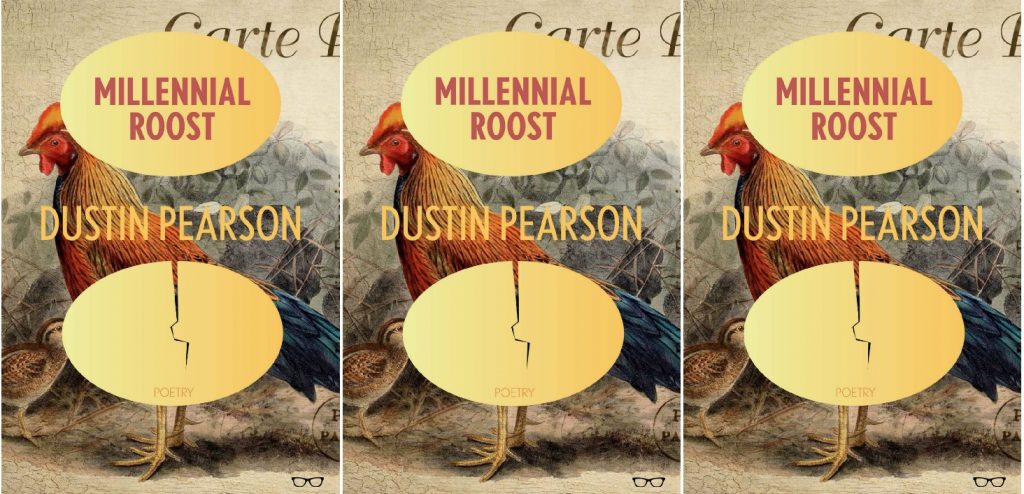In his essay “The Stable Ambivalence,” poet Dustin Pearson describes how the mellowness of personal resolve can temper passion and sensitivity. Ambivalence, applied in that manner, becomes a social defense mechanism to prevent the self from both experiencing and inflicting trauma. In his debut poetry collection, Millennial Roost (Eyewear Publishing, 2018), Pearson’s speaker is constructed through that lens of ambivalence. The mechanism allows his speaker to evade overt responses and, in keeping with his theory, maintain control in what would otherwise be considered compromising situations.
A veteran of trauma, the book’s speaker subverts victimhood by inviting readers to roam the rooms and hallways where abuse festers and eventually transmogrifies into feathers. The brilliance of Millennial Roost is Pearson’s ability to explore dark, difficult conversations, but with the consideration and wherewithal to do so without perpetuating pain. His debut is a testament to balance, a high wire act, that tightrope walk of recollection and reexamination that signifies that his speaker, exploring assault, chooses to do so on tiptoes. As he says in “The Stable Ambivalence,” any other response would be catastrophic, at least while “violence” waits there, “on either end of […] ambivalence.”
 The primary mode of Millennial Roost is the epistolary. Constructed around a series of sequential letters, Pearson’s debut wrestles with the presence of the predatorial Mr. Hen, an unidentified authority figure whom, in the past, has preyed upon and abused the speaker. The speaker confides in us this secret and, admittedly distrustful of those around him (“For the longest I’ve believed every man / will want to hurt me eventually”) decides to place his trust in us, the recipients of his letters. This gesture serves as a covenant as readers become confidantes and co-conspirators on the road to healing.
The primary mode of Millennial Roost is the epistolary. Constructed around a series of sequential letters, Pearson’s debut wrestles with the presence of the predatorial Mr. Hen, an unidentified authority figure whom, in the past, has preyed upon and abused the speaker. The speaker confides in us this secret and, admittedly distrustful of those around him (“For the longest I’ve believed every man / will want to hurt me eventually”) decides to place his trust in us, the recipients of his letters. This gesture serves as a covenant as readers become confidantes and co-conspirators on the road to healing.
Acting as a guide on a retrospective tour of trauma, in “Letter 1” the speaker establishes that the reader is a spectator in a museum of abusive memories: “At this point, the tour I’m leading is stopped right outside the stall door. They can hear us. I can usually get this far with groups.” Pearson takes this spectator into scenes of abuse and, considering the bathroom stalls and references to other childhood confinements, readers can assume the assault takes place sometime between the speaker’s preschool and preadolescence. This is nowhere more apparent than in the poem “Sonnet of Questions”:
Do you remember the stakes?
How big of a slut? How much of a man?
How far did he
need to go? How long?
That first time what did I do?
And was I four or five?
The difficulty with addressing this abuse is the audience’s impulse to turn away, to run from it, something the speaker is aware of and prepared for in “Letter 1”:
As the tour guide, I tell them I’ll lead in. When I look back, before the door opens, I realize there isn’t anyone who sticks around. What is it about this? Everyone comes in knowing the tale I’m telling, and what they’ll find.
In this way, “Letter 1” references the danger of the disappearance of those the survivor-speaker has come to depend upon and count on: friends and family. This inaugural letter forces the reader to confront the often-overlooked, residual, and reverberating traumas of survival: going home and dealing with the indifference and apathy from those who are meant to protect and help one cope. In Millennial Roost, this indifference is as traumatic as the assault itself.

At its core, Millennial Roost explores the difficult task of trying to shape a personal and sexual identity after having been forced to participate, physically, in an encounter prior to understanding consent or reaching sexual maturity. Adhering to the ideas presented in “The Stable Ambivalence,” Pearson’s speaker resists overtly confronting the assault and abuser. Instead, the conflict is “coded and off-screen” and transmogrified from reality into an allegorical tale of a chicken and the toxic eggs he leaves on his path. At turns comic and heartfelt, Pearson’s speaker, in the face of so much darkness, reminds readers that life doesn’t end with trauma — it just has a new beginning.
Through the chicken allegory and the ubiquity of egg imagery, Pearson builds a world in which the eggs’ ever-encroaching, pop-up-where-you’d-least-expect-them tendency begins to elicit claustrophobia. Otherwise benign and harmless, the eggs in Millennial Roost become grotesque husks of shelled shames, traumas, and other aggressions. Like the speaker, readers are susceptible to seeing shadows spring up from their own painful pasts and begin, slowly, to recognize the egg-littered landscape as their own. The chicken and egg allegory functions primarily as a medium to examine the ways in which the exorcising of trauma and pain is violently corporeal. It seeps through the pores, it is epidermal and bodily. “Have you ever seen a chicken lay an egg?” he asks. “It can be violent. They get fussy. They scratch and kick up the dirt around them. With each push, they strain. They might moan or scream.” After the egg rests safely in its nest, Pearson’s intent becomes clear. The egg was only made for one purpose: deliverance.
Millennial Roost’s use of letters reaffirms that the epistolary form implies an intimacy through distance. The letters call us in close and back away, they satisfyingly distort and bend, creating an accordion-like effect meant to represent the physical and psychological warp produced by sexual abuse. By recreating that experience for his readers, Pearson ties the audience emotionally to his speaker and, because we’ve already come to trust him, when he finds safety in indecision we find safety in indecision, too. The letters are the ambivalent antidote to the numerous, trauma-filled eggs we’ve come to recognize all around us. When we happen upon them, we become conflicted by the meeting, trying to “decide whether each milestone or union is cause for celebration or mourning.”
Though it confronts and wrestles with darkness, Pearson’s debut is book-ended by intimacy. In the opening poem, “Prelude,” the speaker, despite all he has suffered, is able to muster up enough strength to tell his story. He does so by inviting us to follow him. The difference between the speaker’s intention and his abuser’s, though, is that his intentions are good. In the vulnerability and honesty of the speaker’s invitation, readers come to know the spirit of this book:
I’m sure at this point it’s just you. Me. There’s one thing I want to ask before we go down because it’s deep. You’ve likely seen it coming. It’s important. Be honest. You’ll see things here I wouldn’t show anybody, things I hope you won’t abuse.
By the end we have an answer to the book’s main question: “Is this the kind of thing that excites you?” It is indeed, because we know then that we come out on the other end, alive. In the closing poem, “Postlude,” he urges us to maintain intimacy as we pivot back to our own lives: “Leave me / your letters in these quiet folds. / We’ll keep each other.” And just like that, the reader is left embracing in the in-between, bonded in the balance, returned to a world where all of our hurt, passion, and joy has come home to roost.

Brandon Rushton’s poems appear in Denver Quarterly, Hayden’s Ferry Review, Forklift, Ohio, Sonora Review, and Passages North. In 2016, he was the winner of both the Gulf Coast Prize and the Ninth Letter Award for Poetry. In 2017, he served as the Theodore Roethke Fellow at the Marshall Fredericks Museum and co-founded the poetry outfit Oxidant | Engine. Born and raised in Michigan, he now lives and writes in Charleston, South Carolina and teaches writing at the College of Charleston.




